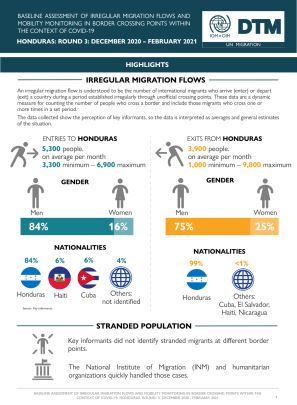-
Countries
-
Data and Analysis
-
Special Focus
-
Crisis Responses
Honduras-Baseline assessment of migration flows and mobiity tracking within the context of COVID-19 report #3 (December, 2020-February 2021)

Contact
Melanie Gomez magomez@iom.int
Language
English
Location
Honduras
Period Covered
Dec 01 2021
Feb 28 2021
Activity
- Event Tracking
The social and economic context in Honduras has been affected by the consequences of the COVID-19 pandemic, as well as those of hurricanes Eta and Iota. COVID-19 caused the implementation of a quarantine throughout the country starting on 12 March 2020. These measures made it impossible to perform informal work activities, affected several enterprises, and resulted in the closing of several family businesses in the communities near the border, causing even greater instability in the social fabric of these communities.
The area to the north -and, to a lesser extent, the west and south- were severely affected by hurricanes Eta and Iota, causing the loss of many homes (on 22 November 2020, estimated included 13,386 houses affected, 985 damaged, and 27 destroyed by hurricanes Eta and Iota). The most affected areas became even more vulnerable zones, and many of the crops in the south and west were damaged beyond recovery.
In addition, the confinement generated more domestic violence in Honduran households (calls to 911 due to domestic violence increased by 16% during the pandemic) which, added to greater unemployment because of the COVID-19 crisis, and the loss of housing and rising food insecurity due to the hurricanes, generally resulted in a worse social, economic and family context. Moreover, the perceived flexibilization of the United States migration policy in the Honduran population has been identified as a factor that appears to contribute to the increase in migration to North America.
